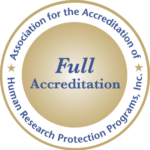Investigational New Drug (IND) Application
An IND application is the document submitted to the Food and Drug Administration (FDA) for permission to conduct a clinical investigation using a drug or biological product that is new or not approved for that dosage, form, or indication.
An investigator is always required to submit an Investigational New Drug (IND) application to study an unapproved (i.e., not commercially available in the U.S.) drug or biologic.
An investigator may be required to submit an IND application to the FDA to study a marketed drug or biologic in a new (i.e. unapproved) clinical indication.
In both cases, the products are considered “investigational” by the FDA.
Review the following true or false statements. If the answer to any of the statements below is “true”, you will need to submit an IND application to FDA.
- The drug used in the investigation is not an FDA-approved, marketed drug.
- The investigation is intended to be reported to the FDA as a well-controlled study in support of a new indication or a change in labeling.
- The investigation is intended to promote or commercialize the investigational drug.
- In the case of prescription drugs, the investigation is intended to support a significant change in advertising for the drug.
The study involves changing the route of administration (e.g., oral to IV), dosing, population (e.g., from adults to children), or other factor that significantly increases (or decreases acceptability of) participant risk.
The documents needed to prepare an IND include:
- Form FDA 1571 (IND Application) or a dossier addressing all of the elements outlined in Form 1571 must be submitted by the sponsor or sponsor-investigator.
- Form FDA 1572 (Statement of Investigator)
- Form FDA 3674 (Certification of Compliance with Requirements of ClinicalTrials.gov Data Bank)
Investigational New Drug Application: Title 21 Code of Federal Regulations Part 312
Information for Sponsor-Investigators Submitting Investigational New Drug Applications (INDs)
Determining Whether Human Research Studies Can Be Conducted Without an IND – FDA Guidance (2013)
Forms and Instructions for IND (FDA)
Guidance on Form 3674
An Investigational Device Exemption (IDE) application is the document submitted to FDA to allow for the conduct of a clinical investigation using an investigational device (an unapproved device or a new intended use of an approved device) that poses a significant risk to the study participant.
An IDE is required if the study involves a significant risk device. A significant risk device is an investigational device that:
- Is intended as an implant and presents a potential for serious risk to the health, safety, or welfare of a participant;
- Is purported or represented to be for a use in supporting or sustaining human life and presents a potential for serious risk to the health, safety, or welfare of a participant;
- Is for a use of substantial importance in diagnosing, curing, mitigating, or treating disease, or otherwise preventing impairment of human health and presents a potential for serious risk to the health, safety, or welfare of a participant; or
- Otherwise presents a potential for serious risk to the health, safety, or welfare of a participant.
The FDA may determine that your study is exempt from FDA regulation. However, the study is still subject to IRB regulation.
In addition to federal and state requirements, USC IND or IDE holders must comply with applicable USC educational training requirements.

